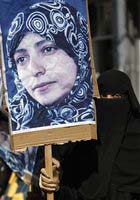
As readers of Tabsir can easily see, I am no friend of dictators or military rulers masquerading as democratic demagogues. The fall of Ben Ali, Mubarak and Qaddafi is a welcome sign, even though it is not clear that the people will be able to achieve the kind of government most want. In Yemen the handwriting and a smatter of twittering is on the wall for Ali Abdullah Salih. He has held on to power far too long, allowing for an ugly power grab that could have been avoided if he had done the noble thing and stepped aside earlier, when given ample chance. But Salih is not Asad and Yemen is not Syria. The swell of the Arab Spring has somehow thrown all the dictators into one soup, one overly ladled with self-righteous indignation. Hatred for the man at the top is clouding the pragmatic need for effective political reform.
Yesterday the recent Nobel Peace Prize recipient, Tawakkul Karman, came to New York and demonstrated outside the U.N. It should be noted that her efforts in Yemen, as one among many individuals organizing the widespread protests, have not yet resulted in the exit of Salih or the emergence of a new viable government. Since she is now center stage as a symbol of peaceful protest, it is strange that she would leave Yemen and vow to stay in New York until Salih’s assets are frozen and he is put on trial in The Hague. Does she really think that this is a bargaining point? Receiving a peace prize is indeed a great honor, but it hardly makes someone into an effective powerbroker. The last thing Yemen needs at this time is for the United Nations or the United States to meddle into the political mess by dictating rather than working with the various Yemeni parties in negotiation. Karman is opposed to the GCC transition proposal because it grants immunity to Salih, but is it really so important to seek revenge on the man at the top when the entire governmental system has been corrupt and military men like Ali Muhsin have as much blood on their hands as the president?
The only peace that will last in Yemen is one brokered from within. Unlike Libya and Syria, where all opposition was brutally suppressed, Salih has had his vocal critics all along and the tribal dynamics of the largely rural population have kept the central state from becoming an all-powerful machine. The United Nations has nothing to offer Yemen politically and I know few Yemenis who want the United States intervening in their affairs. It is bad enough that our drones continue to kill civilians along with suspected al-Qaeda members. Yemen has within its own borders the experience of tribal mediation over centuries. The lack of a powerful central government controlling the life of ordinary people is due in large part to the maintenance of civil society by traditional tribal loyalties and values. Far from being an impediment to governance, these values should be the key to a peaceful transition. It is telling that the major violence in the massive protests has not come from the well-armed tribesmen, but from provocations by the Republican Guard, which the president’s son and cronies are using to maintain a grip on power or other disliked militia-bearing men trying to succeed Salih.
The choice of Karman as a co-recipient of the Peace Prize is iconic rather than based primarily on merit (unlike many of the other Nobel prizes). In the misogynist and Islamophobic climate that informs Western views of the Arab world, I suspect that the choice had less to do with Karman’s activism (which is largely aggrandized in the Western media rather than recognized at home) than the promotion of a Muslim woman working for peace as a symbol. Although she is not decked out in the full-length Yemeni sharshaf, her conservative dress and her credentials in the conservative Islamic Islah party provide a contrast to what most people think of when they see a woman dressed like her. I understand such a rationale, but I question its wisdom. Yemeni society today is far more restrictive of women than it was when I lived there in a rural valley in 1978. This is largely the result of Saudi influence and an unwieldy alliance between an imported Salafi conservatism and northern tribal leaders. Salih, despite his many faults, appointed women to high government positions.
Understandably the focus now is on the overthrow of Salih, which is inevitable, but the more significant issue is the kind of government that will follow. Right now there is stalemate rather than civil war. The protests against the regime are so widespread and vibrant that they cannot be stopped by military action. But it is hard to imagine the next government not having the support of the military, which is still overwhelmingly loyal to Salih. And this should not be a surprise to our government, which has pumped millions of dollars in anti-terrorist aid into Salih’s military machine. The GCC proposal remains the best deal on the table. The support of the GCC and Saudi Arabia for Salih should be evident by now, so that calls for a show trial would not be in the interests of the other states on the peninsula.
Give peace a chance, yes. Push for peace, yes. But think before you shove.